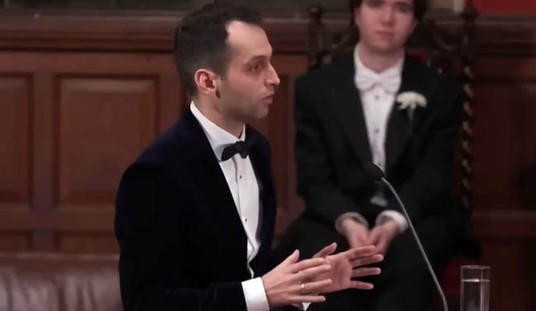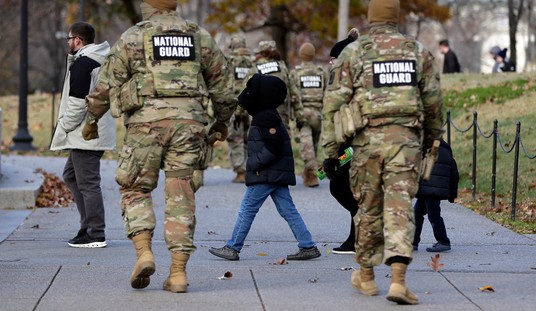Sarah Palin’s critics sometimes poke fun at her regular messaging from her Facebook platform for a supposed lack of depth and heft. Her comprehensive look at military and foreign policy yesterday provides a rebuttal to those critiques, as well as a direct challenge to Barack Obama’s assertions of “smart power.” Palin blasts Obama for his “enemy-centric” foreign policy and criticizes Democrats who seek to score points on fiscal responsibility at the expense of the military:
Meanwhile, the Obama Administration reaches out to some of the world’s worst regimes. They shake hands with dictators like Hugo Chavez, send letters to the Iranian mullahs and envoys to North Korea, ease sanctions on Cuba and talk about doing the same with Burma. That’s when they’re not on one of their worldwide apology tours.
Do we get anything in return for all this bowing and apologizing? No, we don’t. Yes, Russia voted for a weak sanctions resolution on Iran, but it immediately stated it could sell advanced anti-aircraft missile to Iran anyway, and would not end its nuclear cooperation. In response to North Korea’s unprovoked sinking of a South Korean Navy ship, China warned us not to take part in military exercises with our ally.
And while President Obama lets America get pushed around by the likes of Russia and China, our allies are left to wonder about the value of an alliance with the U.S. They have to be wondering if it’s worth it. …
It has led one prominent Czech official to call Obama’s foreign policy “enemy-centric.” And this “enemy-centric” approach has real consequences. It not only baffles our allies, it worries them. When coupled with less defense spending, it signals to the world that maybe we can no longer be counted on, and that we have other priorities than being the world leader that keeps the peace and provides security in Europe, in Asia and throughout the world.
Together with this enemy-centric foreign policy, we see a lessening of the long, bipartisan tradition of speaking out for human rights and democracy. The Secretary of State said she would not raise human rights with China because “we pretty much know what they are going to say.” Democracy promotion programs have been cut. Support for the brave Iranians protesting their government was not forthcoming because President Obama would rather try to cut a deal with their oppressors.
When the world’s dictators see the United States unconcerned with human rights and political freedom, they breathe a sigh of relief, because they know they have a free hand to repress their own people.
This goes against the very ideals on which our republic was founded. There is a long bipartisan tradition of speaking out in favor of freedom – from FDR to Ronald Reagan. America loses something very important when its President consigns human rights and freedom to the back burner of its international priorities.
Ironically, this is a charge usually leveled at Republican Presidents. The Left regularly criticized Ronald Reagan and the first George Bush for their alliance with countries opposing Soviet and Cuban expansionism, especially in the Western Hemisphere. Their defense of socialist revolutions almost always rested on the human-rights violations of the anti-communist governments that the US supported, or in some cases, the anti-communist insurgents, such as the contras in Nicaragua. George W. Bush really transformed that dynamic, making the Left a lot more Scowcroftian in their opposition to his foreign policy, and Obama takes that even farther than Brent Scowcroft himself would go.
Palin sees this as an indication that Obama sees America far differently than most of his fellow Americans:
When asked whether he believed in American exceptionalism, President Obama answered, “I believe in American exceptionalism, just as I suspect that the Brits believe in British exceptionalism and the Greeks believe in Greek exceptionalism.” Amazing. Amazing.
I think this statement speaks volumes about his world view. He sees nothing unique in the American experience? Really? Our founding, and our founding mothers and fathers? Really? And our history over the past two and half centuries?
Really? He sees nothing unique in an America that fought and won two world wars and in victory sought not one inch of territory or one dollar of plunder? He sees nothing unique in an America that, though exhausted by conflict, still laid the foundation for security in Europe and Asia after World War II? He sees nothing unique in an America that prevailed against an evil ideology in the Cold War? Does he just see a country that has to be apologized for around the world, especially to dictators?
President Obama actually seems reluctant to even embrace American power. Earlier this year when he was asked about his faltering Middle East peace process, he said “whether we like it or not, we remain a dominant military superpower.” Whether we like it or not?! Really? Mr. President, this may come as news to you, but most Americans actually do like it. And so do our allies. They know it was our military might that liberated countless millions from tyranny, slavery, and oppression over the last 234 years. Yes, we do like it. As a dominant superpower, the United States has won wars hot and cold; our military has advanced the cause of freedom and kept authoritarian powers in check.
Most of this relates back to Palin’s main topic, defense spending. Democrats have made a lot of noise of late about reducing the military budget in order to demonstrate fiscal discipline, but Palin reminds her readers that defense is the main Constitutional duty of the federal government. There is certainly room for improvement in efficiency and procurement, which is a morass even in the best of times, but reduction of forces is a bad idea for a nation at war. The Navy appears to be their main target, but our Navy remains the protector of trade routes and the basic extension of American power around the globe. The problem with retreating from that position will be the question of who fills the vacuum — and the answer to that question would almost certainly be China.
Be sure to read it all.









Join the conversation as a VIP Member